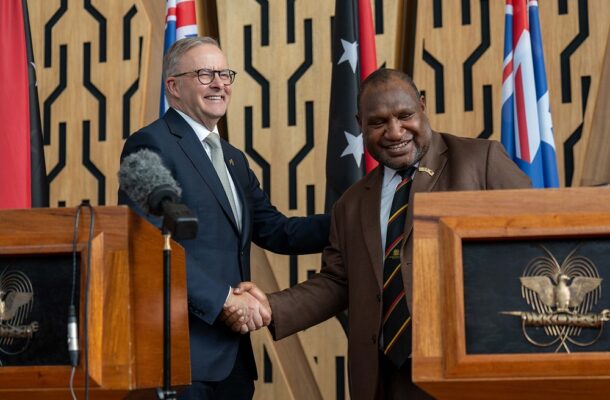China’s growing influence in the Pacific islands region hasn’t ended, but there are signs that it’s slowed, especially on security issues. There’s been progress on the ground to withstand Chinese political warfare.
Like-minded countries such as Australia, the US, Japan and France are working better together to create a climate for island state resilience at the macro level. South Korea will soon hold its first-ever Pacific Islands Summit. Fiji has acknowledged Israel for its Pacific islands work in climate change, agriculture, health, education and disaster rehabilitation. India’s Narendra Modi will make the first visit by an Indian prime minister to Papua New Guinea later this year. Indian engagement with the Pacific has enormous potential to transform local economies.
One area to watch in the near term is what happens in the island states that have a compact of free association with the US. There are elections coming up this year in Marshall Islands and the Federated States of Micronesia. Palau goes to the polls next year. If the US and its allies were to lose one of the COFA states to a pro-China government, the regional outlook would change for the worse.
But for now the regional picture, while still fragile, is looking brighter. A year ago Vanuatu looked like it would fall under significant Chinese influence. A new government in Vanuatu has changed that, as evidenced by the successful visit by the new prime minister, Ishmael Kalsakau, to Canberra. A security agreement was signed as well as a commitment to build stronger trade and investment links. That’s not to argue for complacency: last month Vanuatu failed to issue timely clearance for a US Coast Guard vessel to commence planned ship-rider arrangements in the fight against illegal, unreported and unregulated fishing in the region.
In recent years there’s been a concern that Fiji was embracing much stronger ties with China at the expense of traditional partners Australia and New Zealand. But a general election and a change of government have shifted the outlook significantly. The new prime minister, Sitiveni Rabuka, campaigned openly against closer engagement with China. He has now begun implementing his commitment. A visit to Canberra and a possible security agreement are on the cards. More Australians are holidaying in Fiji following the worst of the pandemic. Greater Australian investment is likely.
China has made some serious diplomatic blunders that highlighted its relative inexperience in the Pacific. An attempt to play ‘divide and rule’ in the Pacific Islands Forum backfired spectacularly. China had wanted a majority of island nations to sign up to a security agreement with it. Initially Kiribati fell into line and broke away from the forum. But some skilful regional diplomacy, including by Australia’s Foreign Minister Penny Wong, has seen Kiribati come back to the regional body.
Last week’s visit by Wong to Kiribati and her attendance at the Pacific Islands Forum’s leaders’ retreat in Fiji further strengthened our relations and support for the forum. On her Kiribati visit, her first to the nation as foreign minister, Wong signed a memorandum of understanding on joint priorities and committed to a new comprehensive bilateral strategic partnership.
Perhaps the biggest setback for China came when Papua New Guinea committed to a comprehensive defence and security agreement with Australia. A highly successful visit to PNG in January by Prime Minister Anthony Albanese, backed up by Wong, achieved a good outcome for Australia.
The PNG foreign minister has played a key role in bringing Australia and PNG as close as they have been for a generation. This month both countries committed to increasing PNG’s participation in the Pacific Australia Labour Mobility scheme and expanding opportunities under the scheme for PNG workers in Australia. They agreed to establish a joint ministerial working group on the sensitive topic of internal security.
The only island country where China continues to have real and growing success is Solomon Islands. The ouster last month of the anti-China premier of Malaita, Daniel Suidani, and his replacement with a pro-China figure removed one of Beijing’s biggest obstacles. One of the first acts of the new Malaita executive government was to kill the communiqué that had put in place a moratorium on business licences to new investors connected directly or indirectly with the Chinese Communist Party.
What’s also of continuing concern about China’s influence is its trade and economic dominance in key areas in a number of island countries, most notably Papua New Guinea. China has an absolute stranglehold over log exports from PNG. It dominates when it comes to seafood imports and a growing share of the import of PNG’s agricultural exports. Indeed, China now dominates seafood imports from many island nations with limited downstream processing.
Australia’s regional diplomacy in recent months has delivered some good outcomes. But China hasn’t dropped the ball on its campaign to ramp up its influence in the region. Last week it announced the first special envoy of the Chinese government to the Pacific islands, former Chinese ambassador to Fiji Qian Bo. It has also opened a new centre for managing natural disasters in the Pacific.
Moving forward, Australia should adopt Indo-Pacific security expert Rory Medcalf’s advice to take up the role of ‘informal coordinator for other international contributors encouraging them to invest efficiently, for the long haul and in line with what Pacific communities want’. Canberra’s focus should also be on economic links and business engagement. A window of opportunity has opened. Australia must strengthen business and investment links as its build on its success across the region to counter the influence of malign actors.














